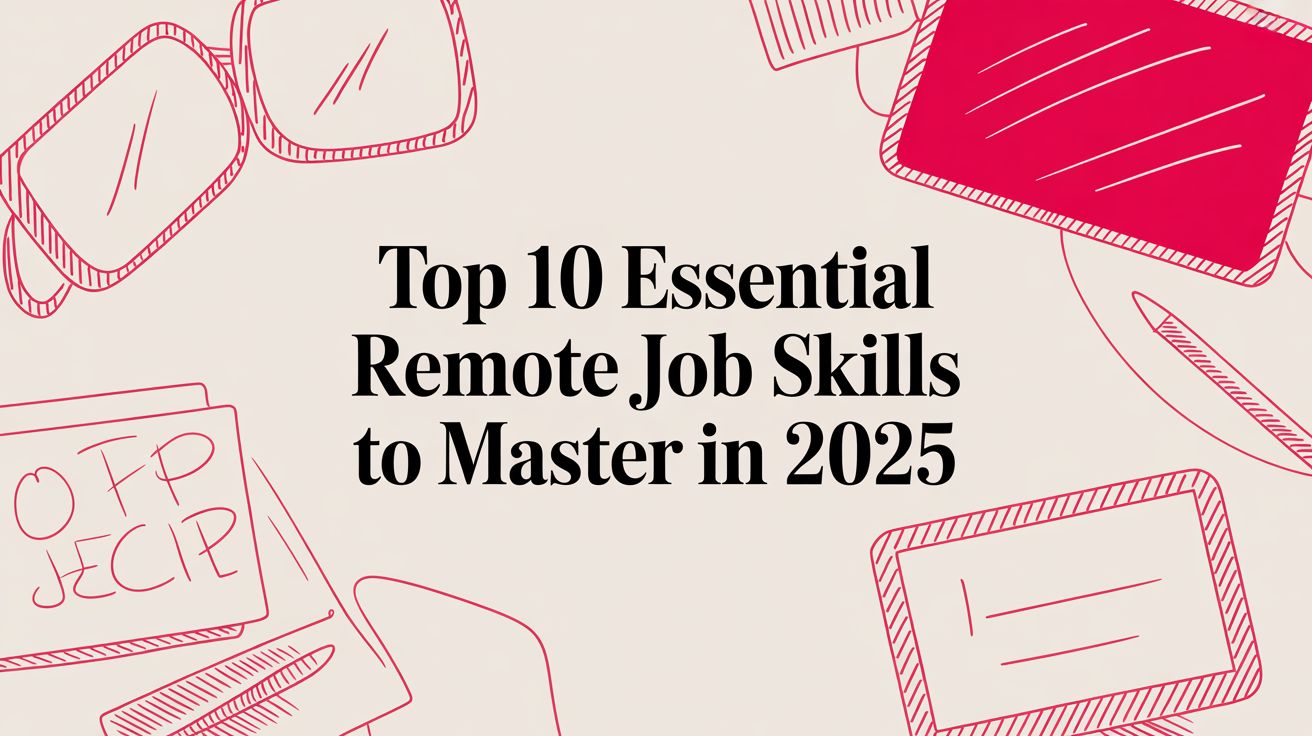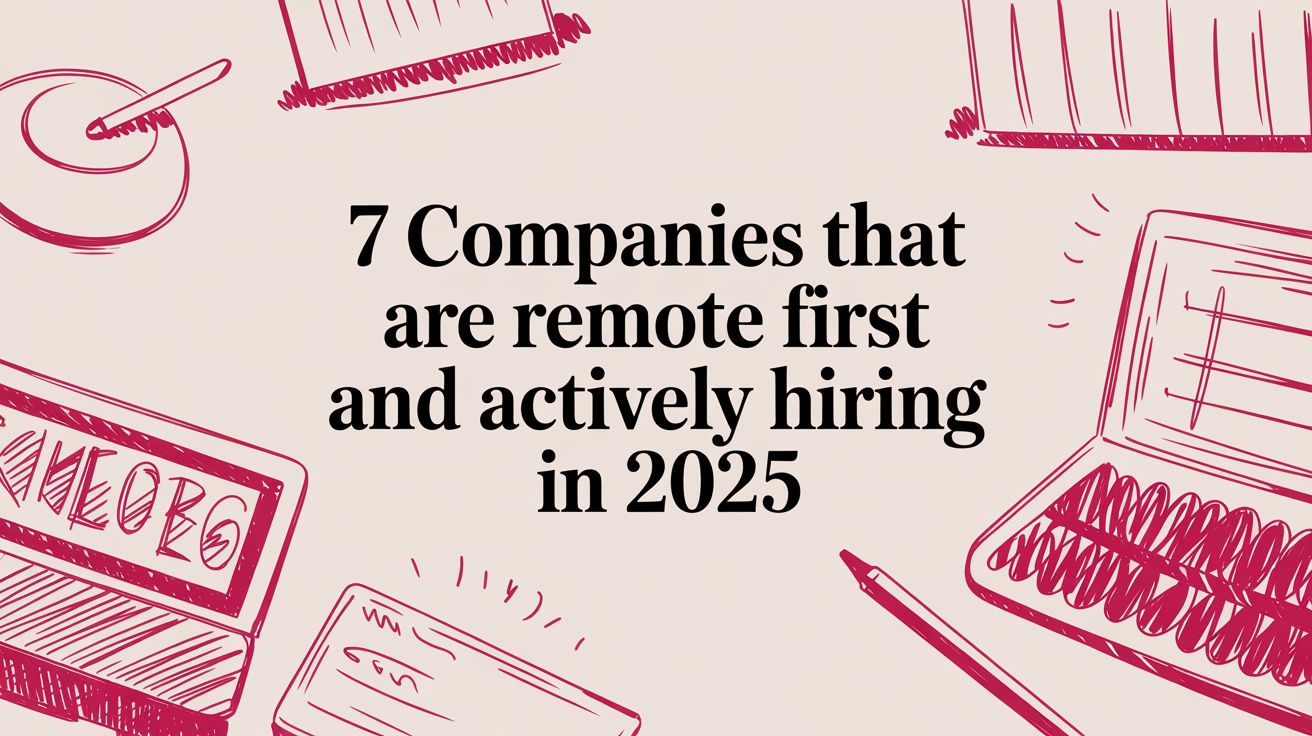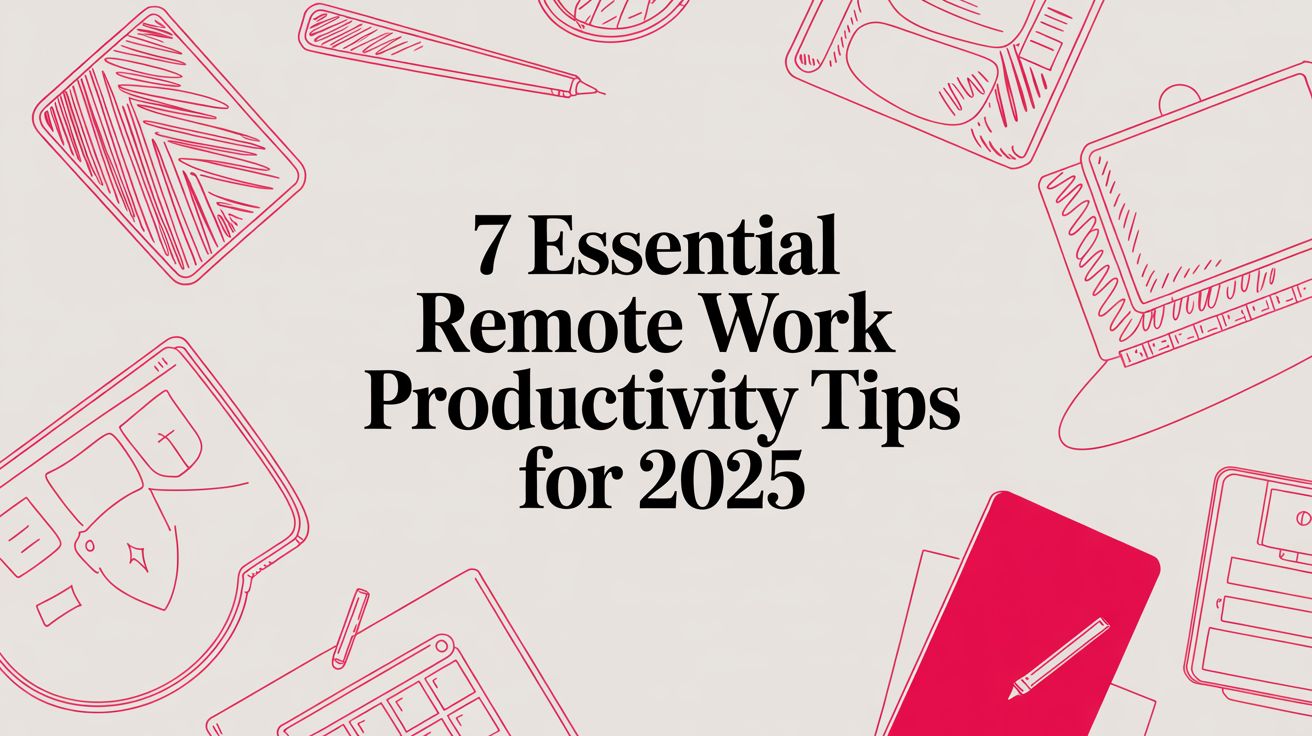In a world that’s constantly accelerating, the demand for careers that adapt to our lives, not the other way around, has never been higher. The traditional 9-to-5 is being reshaped by a global workforce seeking autonomy, purpose, and a healthier integration of personal and professional life. The good news? The market is responding.
The rise of digital tools and a significant shift in company culture have unlocked numerous opportunities for professionals to find fulfilling careers on their own terms. This guide is your roadmap to the best jobs with flexibility available today. We will explore nine top-tier roles that offer more than just a paycheck; they provide the freedom to design your workday, control your environment, and achieve a genuine work-life harmony.
Whether you’re a creative, a tech enthusiast, or a strategic planner, there’s a flexible path waiting for you. This article dives into the specifics of what these roles entail, their earning potential, and exactly how you can successfully land one. For those ready to start their search, various platforms now curate thousands of vetted remote positions, making it easier than ever to connect with companies that prioritize employee well-being and genuine flexibility.
1. Software Developer/Engineer
Software developers and engineers are at the forefront of the flexible work revolution, designing and building the digital infrastructure our world runs on. This role is inherently suited for flexibility because the work is primarily computer-based, allowing professionals to contribute from anywhere with an internet connection. Their project-oriented tasks can often be completed on a non-traditional schedule, making it one of the top jobs with flexibility available today.

This field consistently ranks as an ideal career path for remote work due to its high demand and asynchronous potential. Companies like GitLab, which operates an all-remote workforce across 65+ countries, and Automattic, the company behind WordPress, have proven that large-scale software development can thrive without a central office.
Key to Success
To land a flexible software development role, focus on building tangible proof of your skills and adopting habits that support remote productivity.
- Build a Strong Portfolio: Your GitHub profile or personal website is your modern resume. Showcase diverse projects that demonstrate your problem-solving abilities and coding proficiency in high-demand languages like Python, JavaScript, or Go.
- Master Communication: Technical skills are only half the equation. Excelling in a remote environment requires clear, concise written communication and the ability to collaborate effectively with a distributed team using tools like Slack and Jira.
- Create a Productive Workspace: Designate a specific area in your home for work. A dedicated, ergonomic setup minimizes distractions and signals to your brain that it’s time to focus, helping you maintain a healthy work-life boundary.
Pro Tip: Don’t just list your skills; demonstrate them. Contribute to open-source projects or build a small application that solves a real-world problem. This provides concrete evidence of your capabilities to potential employers.
By specializing in in-demand technologies and actively participating in online developer communities, you can position yourself as an ideal candidate for a high-paying, flexible role. Explore a deeper analysis of why this is one of the best careers for remote work to further your understanding.
2. Digital Marketing Specialist
Digital marketing specialists are the creative strategists behind online growth, executing campaigns across channels like social media, search engines, and email. This role is a prime example of a job with flexibility because its success is measured by performance metrics, not hours clocked in an office. The work is almost entirely digital, allowing professionals to manage campaigns and analyze data from any location.
The results-driven nature of digital marketing makes it ideal for flexible schedules. Companies like HubSpot and Buffer have built successful, fully distributed marketing teams, proving that creativity and collaboration thrive in a remote setting. These organizations prioritize campaign outcomes, giving their specialists the autonomy to work when they are most productive, whether that means optimizing ads late at night or scheduling social media posts early in the morning.
Key to Success
To secure a flexible digital marketing position, you must demonstrate measurable impact and a proactive approach to skill development.
- Build a Portfolio of Results: Go beyond listing your duties. Create a portfolio that showcases specific campaign results with hard data. Include screenshots of improved Google Analytics metrics, successful ad campaign ROI, or email marketing open rates to provide tangible proof of your value.
- Master Key Marketing Tools: Proficiency in industry-standard tools is non-negotiable. Gain expertise in Google Analytics, Google Ads, and marketing automation platforms like HubSpot or Marketo. Certifications in these areas can significantly boost your credibility.
- Develop T-Shaped Skills: While specializing in one area like SEO or PPC is valuable, having a broad understanding of multiple marketing channels makes you a more versatile and attractive candidate. Show that you can contribute to content, social media, and email strategies.
Pro Tip: Create a personal project or offer your services to a local non-profit to build a case study. Document your process from strategy to execution and highlight the final results. This demonstrates initiative and practical expertise.
By proving you can drive measurable growth and mastering the tools of the trade, you can position yourself for a dynamic and flexible career in digital marketing.
3. Graphic Designer
Graphic designers are visual storytellers who create concepts for everything from logos and websites to marketing materials and brand identities. This creative field is a natural fit for flexible work, as tasks are project-based and can be completed from any location with the right software and hardware. The ability to work with multiple clients on a freelance basis or for a company with a remote-first policy makes it one of the premier jobs with flexibility.

The rise of digital media has amplified the demand for skilled designers who can manage their own schedules. Platforms like 99designs connect freelancers with global clients, while renowned agencies like Pentagram are known for flexible schedules that foster creativity. This project-driven work allows designers to control their workload and achieve a better work-life balance.
Key to Success
To thrive as a graphic designer with a flexible schedule, you must combine creative talent with strong business acumen and self-discipline.
- Build a Diverse Portfolio: Your portfolio is your most powerful marketing tool. Showcase a range of projects that highlight your unique style, technical skill, and versatility across different media, from print to digital UX/UI design.
- Master Industry Tools: Proficiency in the Adobe Creative Suite (Photoshop, Illustrator, InDesign) is non-negotiable. Staying current with design software and trends is essential for delivering high-quality, professional work.
- Develop Strong Client Communication: Clear communication is vital for managing expectations, interpreting feedback, and delivering a final product that aligns with the client’s vision. Set clear boundaries and project timelines from the start.
Pro Tip: Don’t just show your finished work; tell the story behind it. In your portfolio, briefly explain the problem, your creative process, and how your design solved the client’s needs. This demonstrates strategic thinking, not just technical skill.
By building a compelling brand, networking within design communities like Dribbble, and consistently delivering excellent work, you can build a sustainable and rewarding career with maximum flexibility.
4. Content Writer/Copywriter
Content writers and copywriters are the architects of the written word in the digital age, crafting everything from blog posts and website copy to marketing emails and social media updates. This role is a prime example of a job with flexibility, as the work is deadline-driven rather than location-dependent. Professionals can produce high-quality content from anywhere, often setting their own hours to match their creative peak.

The demand for skilled writers has surged as businesses prioritize content marketing. Companies like Contently and ClearVoice have built entire platforms connecting freelance writers with brands, while agencies like ConversionXL hire top-tier copywriters globally. This demonstrates that impactful writing can be produced effectively within a distributed, flexible work model.
Key to Success
To thrive as a flexible content writer or copywriter, you must blend creative talent with strategic business acumen and disciplined self-management.
- Develop a Niche and Portfolio: Specialize in an industry like SaaS, finance, or healthcare to command higher rates. Create a portfolio with diverse samples (blog posts, case studies, ad copy) that showcase your range and expertise.
- Master SEO and Content Strategy: Great writing is only effective if it gets seen. Learn the fundamentals of search engine optimization (SEO), keyword research, and content marketing principles to provide greater value to clients.
- Organize Your Workflow: Use project management tools like Trello or Asana to manage multiple client deadlines and deliverables. Strong organizational skills are crucial for maintaining a steady stream of work and a professional reputation.
Pro Tip: Your writing is your best marketing tool. Start a personal blog or build a strong LinkedIn presence to showcase your voice, expertise, and understanding of content strategy. This not only builds a portfolio but also attracts inbound leads.
By honing your craft and treating your writing as a business, you can build a successful and highly flexible career. Ensure your application materials are tailored for these roles by reviewing how to craft an effective resume for remote jobs to stand out.
5. Virtual Assistant
Virtual assistants (VAs) provide a wide range of administrative, technical, and creative support to businesses and entrepreneurs from a remote location. This career path is the epitome of autonomy, offering the freedom to choose clients, set your own hours, and work from anywhere in the world. As the demand for remote operational support grows, the role of a VA has become one of the most accessible jobs with flexibility.

The concept was popularized by entrepreneurs like Tim Ferriss in “The 4-Hour Workweek” and has since evolved into a thriving industry. Companies like Belay, which connects VAs with executive-level clients, and Time Etc have built successful business models around this flexible workforce, demonstrating its value and staying power in the modern economy.
Key to Success
To thrive as a virtual assistant, focus on specializing in high-demand skills and building a professional brand that attracts ideal clients.
- Specialize in High-Value Services: Instead of being a generalist, specialize in areas like social media management, bookkeeping, podcast editing, or email marketing. Niching down allows you to command higher rates and target a specific client base.
- Master Productivity Tools: Proficiency in project management software like Asana or Trello, communication platforms like Slack, and CRM systems is essential. Demonstrating you can efficiently manage multiple clients and tasks makes you a more attractive hire.
- Create Clear Service Packages: Structure your offerings into tiered packages with clear deliverables and pricing. This simplifies the sales process for potential clients and establishes your professionalism from the start.
Pro Tip: Build credibility by gathering testimonials and creating case studies from your first few clients. Social proof is incredibly powerful and can be the deciding factor for entrepreneurs looking to delegate critical tasks.
By developing a specialized skill set and marketing yourself effectively to entrepreneurs and small businesses, you can create a highly flexible and profitable career.
6. Data Analyst
Data analysts are the storytellers of the digital age, translating vast sets of numbers into actionable business intelligence. This role is a cornerstone of modern decision-making and is perfectly suited for flexible work arrangements. Because the core tasks of data collection, cleaning, analysis, and visualization are computer-based, analysts can effectively contribute from any location, making it one of the most in-demand jobs with flexibility.
The project-driven nature of data analysis allows for significant schedule autonomy. Companies like Spotify and Airbnb have built powerful distributed data teams, recognizing that talent and insight are not confined to a single geographic location. This trend empowers analysts to work as full-time remote employees, freelance consultants, or project-based contractors.
Key to Success
To secure a flexible data analyst position, you must demonstrate a combination of technical prowess and strong communication skills.
- Master Core Technical Skills: Proficiency in SQL is non-negotiable for data extraction. Complement this with a strong command of a programming language like Python or R for data manipulation and statistical analysis.
- Build a Tangible Portfolio: Create a collection of projects that showcase your analytical process from start to finish. Use public datasets from platforms like Kaggle or government websites to analyze real-world problems and visualize your findings.
- Develop Strong Communication: The best analysis is useless if it cannot be understood. Practice communicating complex insights clearly and concisely to non-technical stakeholders using tools like Tableau or Power BI to create compelling data visualizations.
Pro Tip: Don’t just show the final chart; explain the “why” behind your analysis. Document your methodology, the questions you asked, and the business implications of your findings. This storytelling ability sets you apart from other candidates.
Focusing on these areas will prove your value and adaptability, making you a prime candidate for a top-tier flexible role. You can explore a detailed guide on the essential data analyst job requirements to prepare for your career transition.
7. Project Manager
Project managers are the organizational anchors of modern business, responsible for planning, executing, and closing projects while meeting specific goals and success criteria. The rise of digital collaboration tools has transformed this role, making it exceptionally well-suited for flexible work. A project manager can now effectively lead distributed teams across different time zones, making it one of the most in-demand jobs with flexibility.
The work is goal-oriented rather than location-dependent, focusing on deliverables and milestones. Companies like Trello and Asana not only provide the software for flexible project management but also model it in their own operations, demonstrating that complex projects can be successfully managed without a physical office. This shift allows professionals to structure their work around deadlines instead of a traditional 9-to-5 schedule.
Key to Success
To thrive as a flexible project manager, you must combine organizational expertise with exceptional remote leadership and communication skills.
- Obtain Key Certifications: Credentials like the Project Management Professional (PMP) or certifications in Agile methodologies (like Certified ScrumMaster) are highly valued. They validate your expertise and knowledge of industry-standard frameworks.
- Master Collaboration Tools: Deep proficiency in project management software like Jira, Asana, or Trello is non-negotiable. Your ability to configure workflows, track progress, and facilitate team communication within these platforms is critical.
- Develop Strong Leadership Skills: Leading a remote team requires more than just assigning tasks. Focus on building trust, fostering clear communication channels, and motivating team members who you may rarely see in person.
Pro Tip: Create reusable templates and standardized process documents for common project tasks. This not only increases your own efficiency but also provides a clear, consistent framework for your team, reducing ambiguity in a remote setting.
By proving you can deliver projects on time and within budget, regardless of your physical location, you can secure a rewarding and adaptable career.
8. Online Tutor/Educator
Online tutors and educators have redefined the classroom, delivering personalized instruction and academic support through digital platforms. This role is a prime example of a job with flexibility, as it allows professionals to teach students globally, set their own hours, and work from any location. The one-on-one or small group format often allows for asynchronous communication and scheduling outside of traditional school hours.
The rise of online learning platforms has made this career more accessible than ever. Companies like iTalki have created massive global communities for language learning, while Wyzant allows tutors to connect with students across hundreds of subjects on a flexible schedule. These platforms demonstrate that high-quality, impactful education can be delivered effectively in a completely remote and flexible model.
Key to Success
To thrive as an online tutor, you must combine subject matter expertise with strong digital communication skills and a knack for creating engaging virtual learning environments.
- Develop a Niche: Specialize in high-demand areas like SAT/ACT test prep, AP course subjects, or specific programming languages. A focused expertise makes you more marketable and allows you to command higher rates.
- Master Interactive Tools: Go beyond video calls. Effectively use digital whiteboards, screen sharing, and collaborative documents like Google Docs to create an interactive and effective learning experience that keeps students engaged.
- Build Your Reputation: Encourage satisfied students and parents to leave positive reviews on your platform profile. A strong portfolio of testimonials and high ratings is crucial for attracting new clients in a competitive online marketplace.
Pro Tip: Create short, shareable video content demonstrating your teaching style or explaining a complex concept. Posting these on social media or a personal blog can attract students and serve as a powerful marketing tool to showcase your expertise and personality.
By building a strong online presence and leveraging technology to create dynamic lesson plans, you can build a rewarding and flexible career in education. The ability to set your own schedule and rates makes this one of the most empowering jobs with flexibility for those passionate about teaching.
9. UX/UI Designer
UX/UI designers are the architects of digital interaction, crafting intuitive and engaging experiences for users of websites and applications. This role is a natural fit for flexible work because it is driven by project milestones and collaborative digital tools. The design process, from research to prototyping, can be managed effectively from any location, making it one of the most sought-after jobs with flexibility.
The rise of collaborative design platforms has cemented the UX/UI designer’s place in the flexible workforce. Companies like Figma and InVision build tools specifically for distributed design teams, while tech giants like Airbnb and Slack have adopted hybrid and remote models for their design departments, proving that creativity and innovation can flourish without a shared physical space.
Key to Success
To secure a flexible UX/UI design position, you need to showcase a deep understanding of the user-centered design process and demonstrate proficiency with industry-standard tools.
- Develop a Compelling Portfolio: Your portfolio is the most critical asset. It should not just display final designs but narrate the story of your process, including user research, wireframing, usability testing, and the final interface.
- Master Design and Prototyping Tools: Fluency in tools like Figma, Sketch, and Adobe XD is non-negotiable. The ability to create interactive prototypes and collaborate seamlessly within these platforms is essential for remote teams.
- Understand User Research: Great design is built on empathy and data. Learn how to conduct user interviews, create personas, and perform usability tests to validate your design decisions and create truly user-centric products.
Pro Tip: Don’t just show what you designed; explain why you made those decisions. A case study that details your problem-solving approach and links design choices to user needs will set you apart from other candidates.
Focusing on these areas will not only sharpen your skills but also build the evidence needed to land a top-tier flexible role. For more guidance, see this detailed breakdown of what constitutes a good UX portfolio.
Flexibility Comparison of 9 Job Roles
| Role | Implementation Complexity 🔄 | Resource Requirements ⚡ | Expected Outcomes 📊 | Ideal Use Cases 💡 | Key Advantages ⭐ |
|---|---|---|---|---|---|
| Software Developer/Engineer | High - requires coding & testing | Moderate - computer, software, internet | High-quality software solutions | Building digital applications, remote project work | Flexible schedule, high salary, remote work |
| Digital Marketing Specialist | Medium - managing campaigns | Moderate - marketing tools, data platforms | Measurable marketing impact | Online campaigns, social media, SEO optimization | Creative & analytical balance, diverse clients |
| Graphic Designer | Medium - creative design work | Moderate - design software, portfolio | Visually compelling branding & media | Brand identity, print/digital creative projects | High creative satisfaction, flexible freelancing |
| Content Writer/Copywriter | Low to Medium - writing & research | Low - laptop, internet, writing tools | Engaging and optimized written content | Blogs, marketing copy, SEO-focused writing | Location independent, scalable income |
| Virtual Assistant | Low - varied admin tasks | Low - communication tools, tech proficiency | Efficient business support | Admin support, scheduling, client services | Flexible hours, low startup, client choice |
| Data Analyst | High - technical data skills | Moderate - statistical software, databases | Data-driven business insights | Business intelligence, data reporting, consulting | Strong salary, intellectual challenge |
| Project Manager | High - planning & coordination | Moderate - PM tools, communication platforms | Successful project delivery | Cross-team projects, deadline & budget management | Leadership opportunities, remote team handling |
| Online Tutor/Educator | Medium - teaching, lesson prep | Low - teaching platforms, educational tools | Personalized student learning outcomes | Subject teaching, test prep, global students | Schedule control, scalable income |
| UX/UI Designer | High - design & user research | Moderate - design software, prototyping tools | Improved user experience & interface design | App/web interface design, user testing | High demand, remote work, creative & analytical |
Your Next Step Towards a More Flexible Career
The journey to a more autonomous professional life is no longer a distant dream but an achievable reality. As we’ve explored, the landscape of work has fundamentally shifted, creating a wealth of opportunities for those seeking control over their schedules and environments. From the logical precision of software development and data analysis to the creative realms of graphic design and content writing, the path to flexibility is diverse and full of potential.
Each role, whether it’s managing complex projects as a Project Manager or shaping user experiences as a UX/UI Designer, offers a unique blend of freedom and responsibility. The common thread connecting these disparate fields is the empowerment they provide. These aren’t just jobs; they are gateways to a lifestyle where professional ambition and personal well-being can coexist harmoniously.
Turning Possibility into Reality
Identifying your ideal role is just the beginning. The next, most critical phase involves strategic action. To truly thrive in the world of flexible work, you must move beyond passive searching and actively build a profile that commands attention. This involves more than just listing your past experiences; it’s about showcasing your adaptability, self-discipline, and proficiency with the digital tools that power modern remote collaboration.
Consider these actionable steps to bridge the gap between where you are and where you want to be:
- Curate a Specialized Portfolio: Don’t just show what you’ve done; show what you can do for a future employer. Tailor your portfolio to reflect the specific skills required for the flexible roles you’re targeting. A UX designer should showcase case studies, while a writer needs a polished collection of articles or copy.
- Master Your Digital Toolkit: Proficiency in platforms like Slack, Asana, Trello, and industry-specific software is non-negotiable. Highlight your experience with these tools on your resume and in interviews to demonstrate you’re ready to integrate seamlessly into a distributed team.
- Network with Intent: Engage with professionals and companies that are leaders in flexible work. Join online communities, participate in virtual events, and connect with individuals on LinkedIn who are already in the roles you aspire to. These connections can provide invaluable insights and potential opportunities.
The Proactive Approach to Finding Flexible Work
The demand for jobs with flexibility has skyrocketed, but so has the noise in the job market. Sifting through countless listings to find genuine, high-quality opportunities can be a daunting task. For those considering a transition, identifying legitimate work from home jobs can be the crucial first step. It requires a discerning eye and a focus on platforms that prioritize transparency and quality over quantity.
Ultimately, securing a career that offers the flexibility you desire is an investment in your overall quality of life. It’s about creating a sustainable structure where you can produce your best work without sacrificing personal passions and priorities. By taking these deliberate, strategic steps, you’re not just looking for a new job; you are architecting a new future.
Ready to find a role that truly respects your need for flexibility? Stop scrolling through generic job boards and start your search on Remote First Jobs. We curate only the best remote-first positions from companies that genuinely embrace a flexible work culture. Find your next opportunity at Remote First Jobs today.






